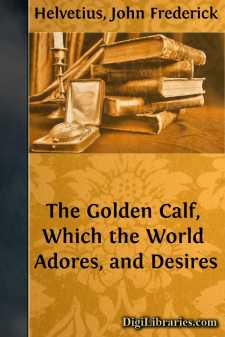Science
- Astronomy 18
- Biology 40
- Chemistry 13
- Electricity 1
- General 38
- History 6
- Light 1
- Paleontology 2
- Philosophy & Social Aspects 1
- Physics 3
- Relativity 2
- Study & Teaching 1
- Waves & Wave Mechanics 1
Science Books
Sort by:
Some thousands of years ago there was a city in Mesopotamia called Surippak. One night a strange dream came to a dweller therein, whose name, if rightly reported, was Hasisadra. The dream foretold the speedy coming of a great flood; and it warned Hasisadra to lose no time in building a ship, in which, when notice was given, he, his family and friends, with their domestic animals and a collection of...
more...
CHAP. I. Most Excellent, and Prudent Sirs. Before I enter upon the Description of the Philosophick PIGMY,(in this little Theatre of Secrets) overcoming and subduing GIANTS, I pray permit me here to use the words of Vanhelmont, taken out of his Book De Arbore Vitæ, fol. 630. and here Transcribed. I compelled to believe, that there is an Aurifick, and Argentick Stone. But (Friend of the Spagyrick Art) I...
more...
CHAPTER I. THE ASTRONOMICAL OBSERVATORY. Early Astronomical Observations—The Observatory of Tycho Brahe—The Pupil of the Eye—Vision of Faint Objects—The Telescope—The Object-Glass—Advantages of Large Telescopes—The Equatorial—The Observatory—The Power of a Telescope—Reflecting Telescopes—Lord Rosse's Great Reflector at Parsonstown—How the mighty Telescope is...
more...
PREFACE. My warmest thanks are due to Mr. Francis Darwin, to Mr. E. B. Poulton (whose interest in the subject here discussed is shown by his share in the translation of Weismann's Essays on Heredity), and to Professor Romanes, for the help afforded by their kindly suggestions and criticisms, and for the advice and recommendation under which this essay is now published. Encouragement from Mr....
more...
In the two preceding lectures I have endeavoured to indicate to you the extent of the subject-matter of the inquiry upon which we are engaged; and now, having thus acquired some conception of the Past and Present phenomena of Organic Nature, I must now turn to that which constitutes the great problem which we have set before ourselves;—I mean, the question of what knowledge we have of the causes of...
more...
This time two hundred years ago—in the beginning of January, 1666—those of our forefathers who inhabited this great and ancient city, took breath between the shocks of two fearful calamities: one not quite past, although its fury had abated; the other to come. Within a few yards of the very spot on which we are assembled, so the tradition runs, that painful and deadly malady, the plague, appeared...
more...
THE SCIENTIFIC EVIDENCES OF ORGANIC EVOLUTION. Although it is generally recognised that the Origin of Species has produced an effect both on the science and the philosophy of our age which is without a parallel in the history of thought, admirers of Mr. Darwin's genius are frequently surprised at the ignorance of his work which is displayed by many persons who can scarcely be said to belong to the...
more...
PREFATORY NOTE. In complying with the wish of the publishers of Professor Haeckel's reply to Professor Virchow, that I should furnish a prefatory note expressing my own opinion in respect of the subject-matter of the controversy, Gay's homely lines, prophetic of the fate of those "who in quarrels interpose," emerge from some brain-cupboard in which they have been hidden since my...
more...
by:
William Bateson
In seeking to discover Darwin's relation to his predecessors it is useful to distinguish the various services which he rendered to the theory of organic evolution. (I) As everyone knows, the general idea of the Doctrine of Descent is that the plants and animals of the present day are the lineal descendants of ancestors on the whole somewhat simpler, that these again are descended from yet simpler...
more...
ON THE RECEPTION OF THE 'ORIGIN OF SPECIES.' To the present generation, that is to say, the people a few years on the hither and thither side of thirty, the name of Charles Darwin stands alongside of those of Isaac Newton and Michael Faraday; and, like them, calls up the grand ideal of a searcher after truth and interpreter of Nature. They think of him who bore it as a rare combination of...
more...











